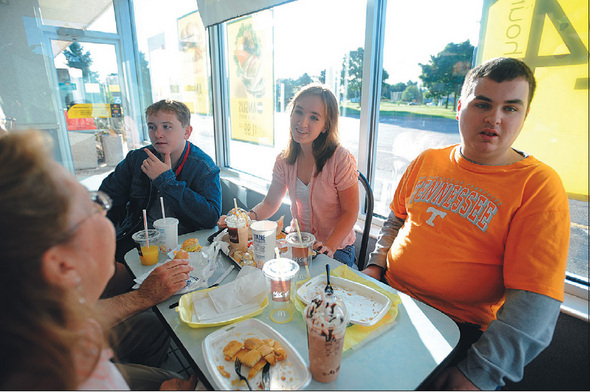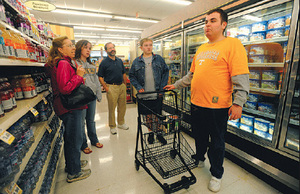Saline schools' Young Adult Program gives disabled adults job and life skills

Cathleen Whiteman, left, enjoys breakfast at McDonald's with her family, Ben 15, second from left, Julianna, 19, and Daniel, 19. Daniel, who has autism, is in a Saline Area Schools program that helps him cope with situations that used to cause him anxiety.
Angele Cesere | AnnArbor.com
A few years ago, Cathleen Whiteman faced a conundrum. Her then 16-year-old son Daniel, who has autism, wasn’t doing well in school. At 6 feet 2 inches tall and 250 pounds, he was getting harder to control. He had already been held back twice. Three doctors suggested an out-of-home placement. Whiteman homeschooled Daniel for a year, and she thought she might have to quit her job to look after her son full-time.
But around that time, Saline Area Schools special education teacher Kevin Musson had an idea. He decided to create a program with the goal of transitioning young adults with disabilities into adult lives.
The award-winning young adult program, now in its fourth year, helps students like Daniel grow more independent, take care of themselves, and even find work. The Michigan Association of School Boards recognized the program with its Education Excellence Award in 2009, and Musson received an Everyday Hero Award from the Warren, Mich.-based RARE Foundation in 2009 as well.
Some of Daniel’s problems stemmed from the fact that he was bored at home but was too anxious to be comfortable somewhere else, Whiteman said. “Kevin’s staff just worked with him.”
The staff, made up of four teachers and 10 para-educators, recognized that Daniel needed a place to feel safe when he started to get anxious. So they found a small room at the school and turned it into his personal office, “to do some academic work there, look at books, do something that was centering for him… And then when he felt like he had gotten recharged, … he could come out and join the group,” Whiteman said.

The Whitemas, from left, Cathleen, Julianna, Cole, Ben and Daniel, take a trip to Busch's supermarket in Saline.
Angela J. Cesere | AnnArbor.com
The staff works with students so that they can focus on learning important life and job skills in the year-round program. As long as the student hasn’t received a high school diploma, and is between the ages of 18 and 26, he or she can participate in the program.
Musson said students shop for their own groceries, make their own lunches, attend classes, and do a daily news report. Students also exercise at the Saline Recreation Center every morning before heading to a job.
“They work like any other adult,” Musson said, usually from 10:30 a.m. to 12:30 p.m. at one of 20 different sites in Saline and Ann Arbor.
A new job site is the Saline Recreation Center. The students in the young adult program will provide vending services, starting in mid-September.
“Students will go to, say Sam’s Club, and shop for the items, purchase them, work on recordkeeping and bookkeeping and things like that, that are important to working a micro-enterprise,” Musson said.
Musson said the program started to do vending at other businesses two years ago, and organizers realized it was a great way to get regular funding.
The program is funded by the Saline school district, but it also does fundraisers. An upcoming one will be Sept. 25th at the Brookside Golf Course in Saline.
Another component of the young adult program is a class for high school students Musson leads. Connecting with Exceptional Individuals teaches high school students to mentor special needs students.
Juliana Whiteman, Daniel’s fraternal twin, attended this class in her junior and senior year of high school. She attended partly to learn more about her brother. Now she is a sophomore at Adrian College, studying teaching. She hopes to be a special education teacher in the future, an interest that was largely sparked by Musson’s class, she said.
Whiteman nominated Musson for the RARE Foundation Everyday Hero Award in 2009. She won a $2500 scholarship for her essay.
Juliana and her mother say that the program made a huge difference in their family life. In families like theirs, “if the special needs kid isn’t happy, ain’t nobody happy. Just like having any family member who is miserable is really hard,” Whiteman said.
Now that Daniel is more comfortable with change and social situations, the family can enjoy going out together, seeing movies and going grocery shopping. These are things Daniel couldn’t do before. And because Daniel is so active in the community through the program, “Every place we go people know Daniel,” Whiteman said.
Christopher Macy, 24, is another student in the young adult program who has blossomed. Macy is also autistic and has been in the program for three years.
One of the best things about the program, his mother Jackie said, is that he has a lot of work experience. “He’s been at a CVS, he’s been at a grocery store, a golf course, giving him some idea of the things he would like to do and also kind of a resume to go from,” she said.
Many students, when they leave, have a resume with experience that can help them get jobs. Students have found work at stores such as Walmart and Busch’s.
“We’ve had a good track record with finding paid employment for our students,” Musson said.
Since starting the program, Christopher has become more independent. “He’ll volunteer to clean up and wash the dishes and do those things,” Macy said. He often surprises the family with his new capabilities.
“Lo and behold, he got up one morning and made himself waffles,” Macy said, chuckling. “I didn’t even know he knew how to make waffles.” It’s something he learned at school.
Macy used to worry that her son would be dependent on their family for the rest of his life. Now, she predicts that he could end up living with friends or co-workers.
Not every student leaves the program with a job, Musson said. Some transition to adult homes, and the young adult program helps the students and families make that change too.
This emphasis on making the change is important, Macy said. “Every young adult goes to the next step,” she said. “They either go to college, or community college, or a vocational school, or get a job or do something at that stage in life. So why shouldn’t these young people have a new phase or a new stage in their life too?”

